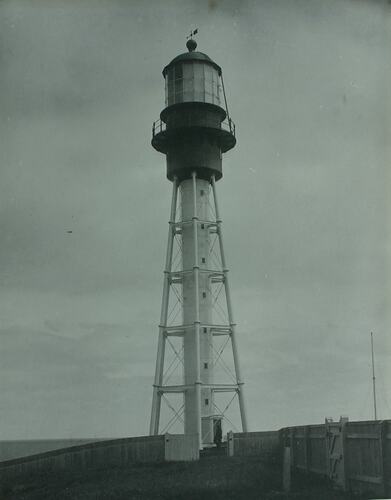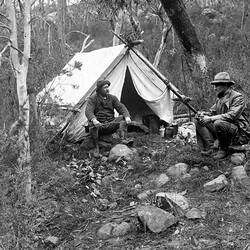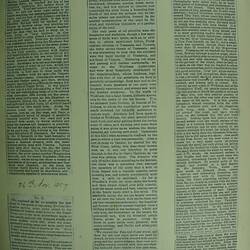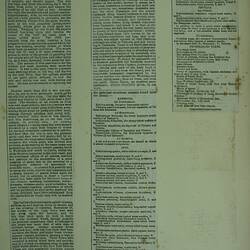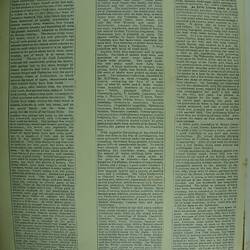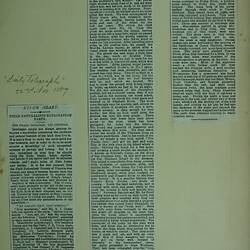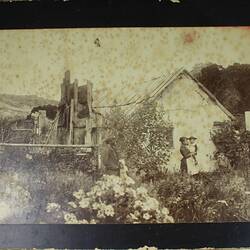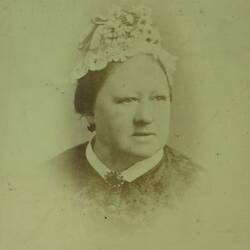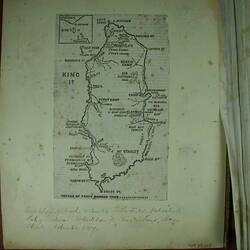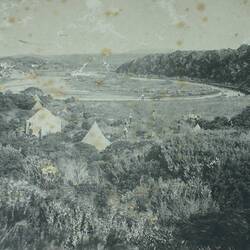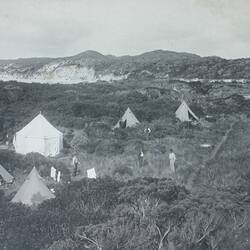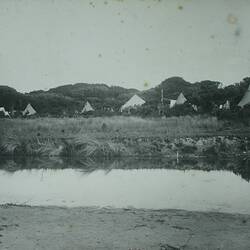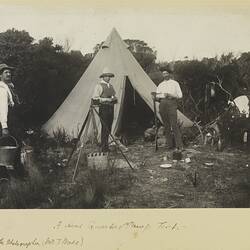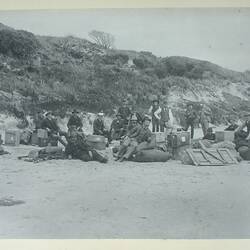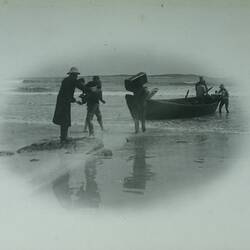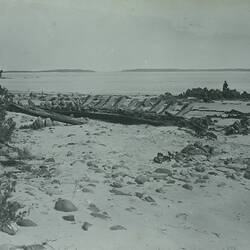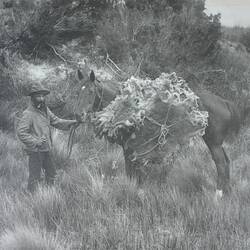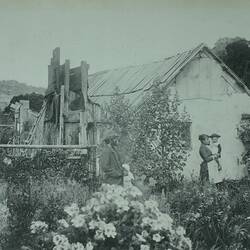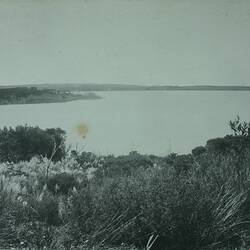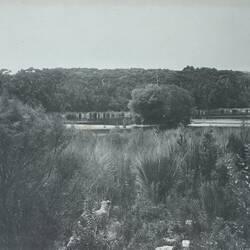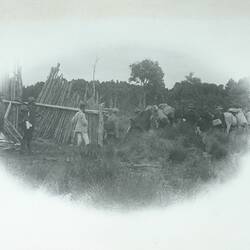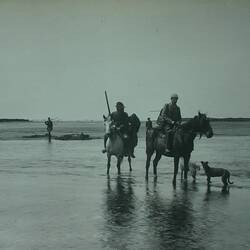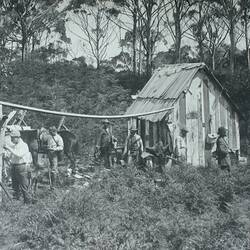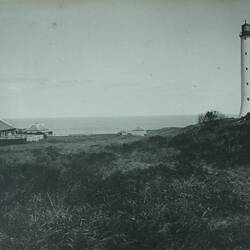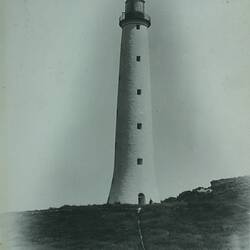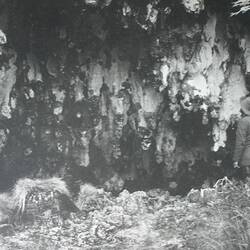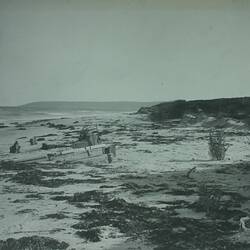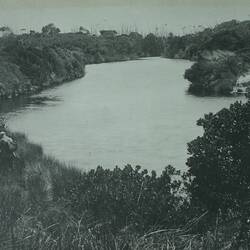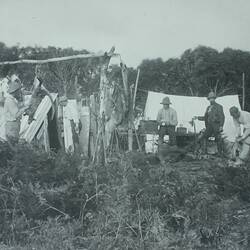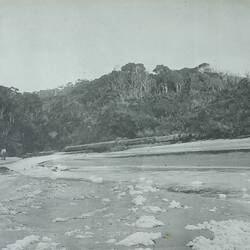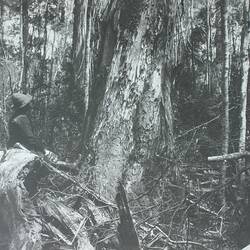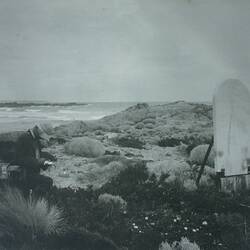Transcribed from The Daily Telegraph, 22nd November, 1889
KING'S ISLANDS
FIELD NATURALIST EXPLORATIONS PARTY
THE ISLAND TASMANIAN, NOT VICTORIAN
Intelligent people are always anxious to acquire a knowledge concerning the product and natural features of the land they live in. It is man's duty to make the earth yield her best treasures, and in order to do so he must acquire knowledge of such recognised sciences a geology and botany. But it is also incumbent on man that he should study the birds, beast, fishes, reptiles and insects of his native land and its adjacent islands, and I make notes of their forms and habits. It is for this purpose that the Field Naturalists Society of Victoria was formed, and when it became known that the member had determined to explore the almost unknown regions of Kings Island, Bass Strait, the idea was received by very body in the community. The government came promptly to the aid of the party and placed a number of defence tents and the Lady Loch at their disposal, and on this 5th November they stated their journey returning at 10 o'clock last night. The following are a few hurriedly gathered notes of the expedition.
'My Gallant crew, Good Morning'
'Now gentlemen' said Mr. A. J. Campbell, the captain of the party, 'answers to your names'. 'Aye, aye sir', was the response and the following 'happy hunters' answered to their names: E. Cornwell, (ornithologist),E. Chandwelle (ornithologist), Deasey and his dog Carlo, J.E Dixon (entomologist), A. J. Campbell and T. G. Campbell (colonists), Dr Lewellin (hospital staff), Charles Lane, Professor Spencer (biologist of the Melbourne University) Dudley Le Souef (Zoological and Acclimatisation Society), C. Frost and - Sheppart (ornithologist), W. Sayer (botanist of the late geographical expedition to New Guinea), F. N. Ingamella (Melbourne Observatory, Chisholm, Sweet, Ernest Dombrain (colonist), T. Wood (assistant to Mr Hart, photographer, lecture of photography at the Workings-men's College), Hughes, A. Cole (taxidermist, Elizabeth Melbourne), M' Kibbon (botanist), W. Hatton (colonist), J. Keartland (naturalist), H.W. Hunt (naturalist)- St John (collector for Mr Alexander Borthwick, jun), and Mons, Musika (cook and billy boiler).
EAST COAST EXPLORATION
On Monday, the 7th inst, the following members set out on the first organised expedition to ascertain what the east coast line was like- Campbell, Le Souef, Cornwell, Chandwelle, Frost, Wood, Chisholm, Sayer and Professor Spencer. The excursion was a rough but pleasant one, and was fraught with good results. But the details of the journey are better told in the professors own word 'Yes you're right, we had a rough time of it, and my nose tells a tale, and has lost much of its natural beauty in battling with the elements'. Starting about 7 o'clock we trudged about six miles along the beach. We were accompanied by Henry Grave, who had extensive knowledge of the locality, having hunted the north and east of the island for last ten years. We struck the land again near camp No. 10. From this pint we made across the island, leaving away on our left a large lake, which named Lake Dobson, after the worthy member of the Legislative Council who did so much to make our trip a success. After travelling some miles in the pouring rain, we passed the Martha Lavina Lagoon, so called after a vessel which was wrecked on the coast close in the day south of Boulder Point. It was high tide, and we had to walk which was very tedious. After passing round Lavini's Point we reached Bertie's or No. 7 camp. The weather had been miserable, and the ground was very damp. Four of us slept in a rest preferred the tent we had brought with us, and which we erected. We had to cover the ground with ti-tree boughs or 'boles' on which we had to lie all night. We did no complain of the discomfort audibly, but we muttered curses deep if not loud, and in the morning our bones ached. Next morning we struck the coast again and walked on to Elephant River. The river runs through very flat country, and saves at its shallow estuary, is deep enough for boat traffic; but then no boat could cross the shallow bar into the river proper. There is no doubt that boats have been taken across to the river, which has been navigated for miles into the interior. We found any quantity of kangaroo and wallaby about this river. We were taken a Grave's pack-horse. Just to the south of the river were caught a rare bird called 'The Pacific tern' and got its nest and eggs. This is only place in the island where it exists. Skirting the beach for a few miles, and crossing a small rivulet, we reached No. 9, known as Eldorado Camp, on the shore of Sea Elephant Bay. In this spot we could see Elephant Island in the distance. This island is remarkable from being covered with rookeries of cormorant, gulls and mutton birds. From camp No. 9 we divided our party some proceeding inward to the Blackwood range, while some trudged on southwards past Fraser's River to the blue gum forests. It is a peculiar feature that Fraser's River divides two kinds of country. North the land undulates, and is covered with scrub and grass, while to the south the country is hilly and heavily timbered.
Professor Spencer and Mr Le Soeuf pluckily went as far south as they could, but their progress was arrested after they had proceeded about four miles beyond a promontory (which they names Point Campbell) by what is known as the 'brick wall'. Here the cliffs come down vertically to the sea, and arrest all progress by the coast line, while the forest inland is impenetrable. Returning to camp the party re-assembled, and commenced a weary trudge homewards. The provisions of the party by this time were done, and there was no alternative but to turn to the bran, which they carried for the horses, on which to subsist. This they made into a mash and ate, and with an occasional dish of dried kangaroo tail soup, they got, they got on fairly well. Instead of returning to the headquarters camp, the party proceeded to Camp Wickham. Their last meal exhausted even the 'bran mash' which was carefully doled out to each member. It may be mentioned the on the first day after the east coast party set out, Mr Sayers, who had only recently returned from New Guinea, became very ill with fever and ague and remained at Bertie's camp in company with Mr Chisholm, who remained to nurse him. He ultimately reached camp in a very exhausted condition, where he was added to carefully by Dr. Lewellin.
THE WEST COAST EXPLORERS
After a Sunday in camp, and a good rest, a second party was made up on the following Monday, the 14th inst., and a start was made to explore the west coast. They went by the coast to Whistler Point, and thence overland at time and at times along the shore proceeded to Pass River. This was yo to that time the only clear water stream come across in the island. Then a weary tramp overland to Porky River, a portion going inland to Porky hut, where they camped. The main body of the party walked through thick scrub to Currie Harbour. They stated, there all night and next day continue southwards. They soon came to British Admiral Bay, where the vassal of that name was wrecked on the 23rd May 1874. There any amount of wreckage was seen. Monuments erected to young Mr. Nicholson and to Tilly Dale, who were drowned out of that vessel, were also visited. The shore here is very rocky and long reefs stretch out to sea and the coast is very dangerous. During 21 years previous to the erecting of the lighthouse at Currie Harbour, 22 wreaks occurred, but none have occurred since. The party next reached Eterick River, when they fossicked a little. It was known that there were numbers of the ornithorhynchus or platypus in the river, but none were seen. Most of the explorers went a little further south till they reached the dripping wells, a most peculiar and interesting limestone's formation. At Fitzmaurice Bay a monument was fond erected in memory of 733 persons who perished in the Cataraque, which was lost there. Messrs; Frost, Chandler and Spencer proceeded further than the rest, and went round Cataraque Point, the most southern point reached being Seal Rock. There Chandler slept all nigh with hopes of catching a young seal. During the night a huge seal crept on to the rock, and uttered two or three roars, which took the stuffing out of the bold hunter, and picking you his gun he fled into the darkness of the night and reached the camp in the morning, haggard and dishevelled. The party then return leisurely to headquarter camp.
More Information
-
Keywords
-
Authors
-
Contributors
-
Article types
